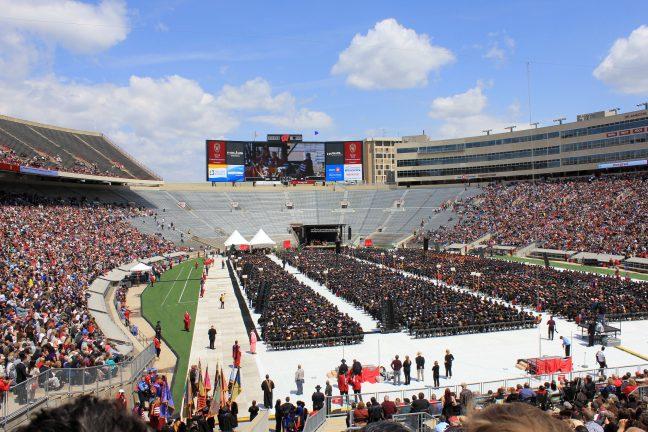Though University of Wisconsin professors and health experts expressed support and assuaged concerns about UW’s decision to hold an in-person commencement ceremony this spring at Camp Randall with only graduating seniors in attendance, the Associated Students of Madison is concerned about the health risks posed by UW’s decision.
One commencement ceremony will be held Saturday, May 8 to celebrate undergraduates and a later ceremony will be held for other graduate degree candidates, according to UW News. Parents and relatives can watch a live-stream of the ceremony while students participating in the in-person ceremony will be expected to follow safety guidelines such as physical distancing, wearing face coverings and presenting a green Badger Badge before entering the stadium, according to UW News.
ASM chair Matthew Mitnick said he is adamantly opposed to UW’s decision to hold an in-person commencement ceremony. Mitnick expressed apprehensions the ceremony this spring could become a “super-spreader” event and put the health of the Madison community and local workers at risk.
“I’m very concerned with the fact that not every person who will be there will have been vaccinated,” Mitnick said. “As we know, with tests, you could test negative and still be carrying COVID.”
UW Health Chief Quality Officer Dr. Jeff Pothof said long term effects, like a sudden rise in cases from a super-spreader event, will only result from the spring ceremonies if the mitigation plan proposed by the university is ineffective.
Pothof voiced support of UW’s proposed plans of mitigating risk of COVID-19.
“Based on what I’m reading on how they’re going to mitigate risk of COVID-19, I think with the structure that they’re saying they’re going to follow, I can support what they’re trying to do,” Pothof said.
Pothof said while there is always some risk associated with an event like this, you have to assess the prevalence of COVID-19 at the time of the event. For example, if the commencement ceremony was in the fall, close to Thanksgiving, even with the current mitigation measures the risk of attending the ceremony would be higher than the reward, according to Pothof.
Pothof continued to explain with cases lower than they were in Thanksgiving, having an in person commencement seems more rational than it would have been a few months ago.
“But, now with cases a little bit lower, the ability to have the safer badger program and minimizing the number of people in the venue, it seems like a reasonable approach,” Pothof said.
UW will adjust their commencement plans if there is a spike in COVID-19 cases at the time of the commencement. According to the UW commencement website, the university will continue to monitor the pandemic conditions and make a choice based on the possible impact on public health.
According to Mitnick, until all graduating seniors attending the ceremony are vaccinated, an in-person ceremony is not a responsible decision. University Health Services anticipates all students living on campus age 16 and older will be eligible to receive the vaccine May 1. According to UW Professor and expert on modeling infections diseases Oguzhan Alagoz the more immunized people introduced into the community, the lower the risk of transmitting the virus.
Alagoz did not give definitive support or disapproval of UW’s decision, but said if parents are allowing their children to go to campus or hang out with their friends, attending the in-person commencement ceremony will not increase their risk of contracting the virus in comparison.
“I am optimistic, but I am cautious,” Alagoz said. “I don’t want to give people a false sense of security. There is [never] no risk whatsoever. It doesn’t work that way [with] infectious diseases.”
ASM will propose legislation March 23 concerning the spring commencement ceremonies and the organization plans to reach out to UW senior class officers and request a meeting, according to Mitnick.
As for Mitnick’s opposition to UW’s decision, Mitnick says it would take support from independent health experts to change his mind.
“It was just interesting that in the fall, I remember with the smart restart proposal, you had health experts from UW saying, ‘Oh, yeah, this is safe. This is great,'” Mitnick said. “And then as we saw with the lockdown early on, from what independent reviewers stated there were a lot of conflicting interpretations of the matter.”
Pothof commented on the possibility health experts under the UW Health umbrella might feel pressure from the university to support their decisions.
Pothof said there is no kind of secret agenda which would change doctors’ medical opinions based on university pressure.
“Our careers are based on our ability to stay impartial and have credibility with society,” Pothof said.


